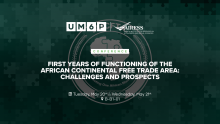Book Review Symposium Introduction: The African Continental Free Trade Area Agreement: Legal and Policy Frameworks (Routledge, 2024)
The African Continental Free Trade Area Agreement: Legal and Policy Frameworks provides a comprehensive assessment of the African economic integration through the prism and principles of international economic law. The analysis is contextualized within the prevailing regional economic integrations, the WTO and the peculiarity of the African Continental Free Trade Area (AfCFTA). Similarly, legal analysis is bolstered by the political economy of the AfCFTA, illustrating the complex interplay of diverse factors that shape the AfCFTA.

